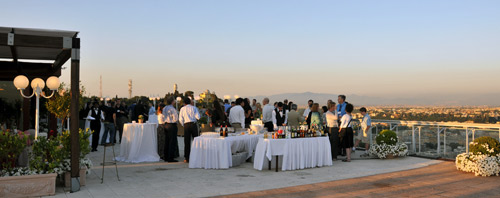Earlier last week I had the chance to attend and speak at a private TTI/Vanguard conference entitled Generation Techs. Due to the nature of the conference I am not allowed to say who was in attendance but I hope to share some of the more interesting things discussed. As I told the conference organizers, it was one of the greatest experiences I have ever had. The people in attendance were accomplished and influential visionaries within their fields. You can get a good sense for the conference just by reading about from the TTI/Vanguard advisory board.

My Talk
The conference was about the digital gap between generations and the emergence of so-called millennials or digital natives. My talk delved into my predictions for the near future, a day in the life of how I use technology, and a Skribit demo to show how it establishes a feedback loop amongst site authors and readers that digital natives have become so accustomed to.
-
Conclusions
- Digital natives have begun embracing web-based services.
- They care about conversation and collaboration.
- Unfortunately, information overload comes with the territory.
-
Predictions
- Everything will be in the cloud. Local storage will only be for caching.
- Users will be able to fully control and maintain their identity, data and connections across websites they use daily. Keep an eye out for OpenID, Data Portability and social graph portability efforts.
- Advances in technologies like collaborative filtering, SVD and natural language processing will help users cut through the noise and eliminate information overload.
Web 3.0 is supposedly all about the so-called semantic web and machines being able to communicate with machines. This process involves adding meta data into existing structures to identify what exactly each piece of information is, but I think we need the ability for machines to understand humans. In 5-10 years, natural language processing will be able to coherently comprehend human language and its use. Imagine being able to feed a piece of NLP software information about you - from your Twitter archives to your blog posts - and just "understand" who you are, like a piece of artificial intelligence formed around your tastes and opinions. Then that could be used to cut down information overload by applying it as post-processing. Imagine having a system know all of your previous interactions with anyone online and being able to prioritize your emails for you, or even act on your behalf. But of course, with great power comes great responsibility.
- Day in the Life of a Digital Native
- Wake up to iPhone alarm, check email on iPhone, go back to sleep.
- Wake up again, roll over to my computer, play music from Pandora or TheSixtyOne
- Check my Google Apps email account. Don't worry about organizing emails, just archive and search later.
- Browse headlines and news items recommended by friends with Feedly
- Check Twitter replies. Twitter shows the power of having many weak connections. I have used it to sell things, seek legal advice from real lawyers, receive answers to technical questions and so on.
- Check Summize (now Twitter Search) results for Skribit. Summize is great for online brand management.
- Check user feedback and issues at GetSatisfaction.com - crowd-sourced tech support
- Use Campfire to collaborate on Skribit development. Once again, everything is logged so we can work at different times, see what everyone is working on and search for past conversations.
- Collaborate on class notes with classmates with Google Docs
- Consume high-quality media at Hulu
Highlights
In no particular order, here are some of the focuses of the conference that I picked up on or thought were interesting:
-
Digital natives have a different sense of privacy and have no problem putting private information on their social network profiles or blogs. Young people have a culture of sharing and peer collaboration. This is one of the reasons I listed for the growth of Twitter among the younger crowd - by putting their relatively private information online, users can find similar people online and establish online connections.
-
Many young people believe that the quantity of text on a web page correlates with the quality of the information.
-
Data is for interaction, not merely for consumption.
-
Amateur vs Professional - Amateurs approach their undertakings with passion and can sometimes outperform professionals. Rise of the amateur with the internet and the proliferation of avenues for content distribution. "Amateurs built Noah's ark, but professionals built the Titanic."
-
Longitudinal observation indicates that an individual's preferred work style evolves, dictated by the demands of the job. That is, it has been predicted that today's 23-year-olds will have the habits of today's 65-year-olds by the time they reach 65 themselves. I'm not sure I agree with this one but it's interesting nonetheless.
-
Human–machine interfaces are not intuitive or nonintuitive; they are either familiar or unfamiliar, and a measure of familiarity is the amount of attention they require of the user.
-
Yet-to-be-released Firefox functionality showed how users could type in phrases in plain English and the browser would carry out certain functions.. moving towards natural language processing.
-
Everything that can be socially powered will be.
-
Groups of children, given appropriate digital resources, can school themselves on their own. The Hole-in-the-wall PC project confirmed this.
-
Mobile connections (GPRS and 3G) are huge in Africa as they are generally faster than landline Internet connections. This might change in 2009 when an undersea cable for Internet connectivity makes its way to Africa.
-
Human-to-computer input mechanisms have largely been limited to conscious commands via voice and hands (via keyboard, mouse, touchpad, touchscreen, trackball, etc.); Emotiv introduces next-gen input directly from the brain.
-
There was a concern that while digital natives have comfort and familiarity with a wide range of technologies and the concept of a technology-mediated life, they do not use their everyday tools deeply nor do they apply mature reasoning to the use of those tools.
-
Large enterprises anticipate an upcoming shortfall in skilled workers at all levels as baby boomers enter retirement in the coming years.
Related: Thoughts on the Future of the Web, When in Rome.. Thoughts?



